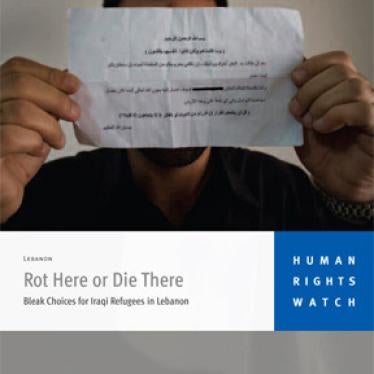(Beirut) --Iraqis are awaiting the outcome of this month's hotly contested parliamentary election with the hope that it will signal the start of a new phase for their country. The stakes are particularly high for the hundreds of thousands of Iraqis who sought refuge over the last few years in neighboring countries, like Syria, Jordan, or Lebanon.
Time is running out for them, as their savings have dwindled, host countries have grown tired of hosting them, and the world's attention has shifted to other conflicts and new displaced populations. No group is perhaps as anxious for the situation to improve as the Iraqis detained in Lebanon for illegal entry. Many of them have finished serving their sentences but remain in jail because the authorities here won't release them in Lebanon and it remains too dangerous for them to return to Iraq.
When one mentions refugees in Lebanon, one usually thinks about the estimated 300,000 Palestinians who live here in appalling social and economic conditions. But an estimated 50,000 Iraqis have sought refuge in Lebanon in the last few years, most of them without legal status and in constant fear of arrest. Like Jordan and Syria, Lebanon does not have a refugee law and accordingly treats most Iraqis as illegal immigrants, regardless of their need to be protected as refugees.
The Lebanese authorities have shown a certain tolerance toward these Iraqi refugees. The security forces do not systematically arrest those without valid residence permits, but they arrest sufficiently large numbers of Iraqis to ensure that the risk of arrest is constantly on their minds. One mid-level security official summarized the policy to me by saying, "We don't want them to get too comfortable."
The number of Iraqis in Lebanese jails for illegal entry or stay has fluctuated. In November 2007, when Human Rights Watch issued a report on their predicament, about 580 Iraqi refugees were in detention. That number has since gone down and currently hovers at around 100.
The real difficulty for these Iraqis starts when their jail sentences end, though. General Security, the agency in charge of border control and foreigners in Lebanon, gives them a choice that does not deserve the name: either they "voluntarily" agree to return to Iraq or they remain in jail. Many of them choose to stay in jail-a clear testament to their assessment of the security situation in their country.
As of last week, there were over 40 Iraqi refugees who had finished serving sentences for illegal entry but who remained in detention. Some of their sentences ended more than a year ago. Frustrated with their situation and their bad detention conditions, many have started hunger strikes or have tried to harm themselves. A local nongovernmental organization reported that two Iraqis beat their heads against a wall last week to protest their continued detention.
Their ongoing detention is not only unfair, it is also illegal. Since December, Lebanese courts have issued rulings in four separate cases that the continued detention of Iraqis who had finished serving their sentences was illegal under Lebanese law and Lebanon's international obligations. However, only three have been released as General Security argues that they cannot be released without proper legal status.
The immediate solution to the problem is clear. Lebanese authorities should release these refugees and grant them temporary residence. Local human rights groups are actively campaigning for the release of these refugees, but they need international support.
Governments outside the region should shoulder their responsibility by continuing to finance humanitarian assistance for refugee-hosting countries in the Middle East and increase the number of Iraqi refugees resettled to their countries. Only an international commitment to find a durable solution for Iraqi refugees will persuade Middle Eastern countries to continue providing temporary protection for Iraqi refugees on their territories.
An Iraqi refugee recently told me that, "Iraq is getting better, but it will be too late for me." Time will tell if his prediction is right. In the meantime, the international community should remember that for many of the Iraqis waiting for things to improve, each day is a new struggle and that for those being held in Lebanese prisons, the option of continued detention or return to Iraq is no choice at all.
..
Nadim Houry is Beirut director for the Middle East division at Human Rights Watch.







